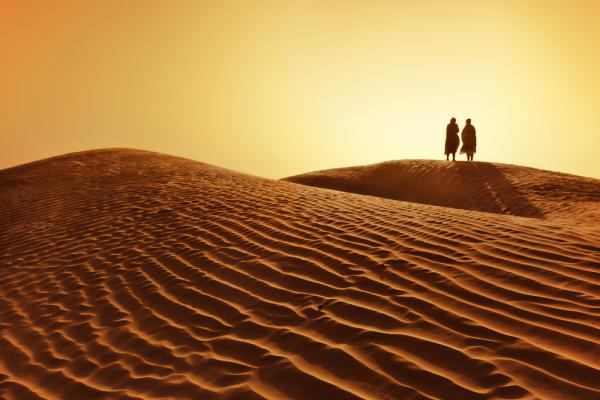I used to be afraid of the desert.
Not a particular desert — I haven’t really experienced much literal desert before (and I don’t count driving through Nevada on the way to Vegas).
But the idea of the desert, of the wilderness, conjured up images in my mind of abandonment, isolation, bare exposure to the elements, discomfort — none of which sounded particularly appealing to me. Indeed, the word “desert” stems from the Latin “deserere,” meaning “to leave, forsake” — again, not making the case for me to want to be there.
To me, the wilderness was a place not only of nothingness but, worse, of negation. It was the place where Hagar and Ishmael were forced to roam upon their banishment, where God cursed the Israelites to wander for forty years, and where Jesus was tempted by the devil, with God seemingly nowhere in sight.
To be in the desert was to be deserted by God.
But the wilderness is also the place where Hagar and Ishmael experienced the provision of God. In the desert of Beersheba, when the water had run out and death seemed inevitable, “God heard the boy crying ... and God opened [Hagar’s] eyes and she saw a well of water” (Gen. 21:17, 19).
The wilderness is also the place where God formed the identity of his people. One generation yearned for the safety of slavery and whined to God constantly; the next generation was willing to walk around the walls of an enemy city doing nothing but blowing their trumpets because God told them that was how they would achieve victory. God gave the Ten Commandments to his people in the desert.
The desert is where the descendants of Isaac became the people of God.
And the wilderness is the place where Jesus was tested and proved ready for the work to which God was calling him. We tend to think that there were only three temptations. But Luke tells us that Jesus, “full of the Holy Spirit … was led by the Spirit in the wilderness, where for forty days he was tempted by the devil” (4:1-2). Jesus was under pressure the whole time — and he overcame it all. Though physically weak, he was spiritually strong.
At the end of his time of testing, Jesus was again described as “filled with the power of the Spirit” (4:14).
I used to think that Jesus began his temptations filled with the Spirit, then got really hungry and barely made it through the temptations, and then once the devil left, Jesus was re-filled with the power of the Spirit. But more and more I think he was full of the Spirit the entire time — that the Spirit led him into the wilderness to test his readiness for the mission, and that the victories Jesus won over the devil in the wilderness — victories that hinged on questions of God’s provision and Jesus’ identity — affirmed to him the presence and preparation by the Spirit of God for the mission Jesus had been sent to accomplish.
In my own life, the concept of desert has taken on the guises of spiritual disillusionment, wrestling through crises of identity, and experiencing the loneliness and frustration of unrequited love and unfulfilled relationships. They’ve been times when I didn’t feel God’s closeness and I didn’t seem to hear God’s voice. They’ve been times when I often felt helpless and impotent in the face of circumstance, when I’ve questioned God’s love and provision.
In The Dark Night of the Soul, sixteenth century Spanish priest St. John of the Cross writes:
At a certain point in the spiritual journey God will draw a person from the beginning stage to a more advanced stage. At this stage the person will begin to engage in religious exercises and grow deeper in the spiritual life.
Such souls will likely experience what is called “the dark night of the soul.” The “dark night” is when those persons lose all the pleasure that they once experienced in their devotional life. This happens because God wants to purify them and move them on to greater heights.
St. John’s language of “dark night” describes aptly how I’ve come to understand the desert.
So often our lives are padded with comfort and distractions that can fool us into thinking we don’t need the provision of God. In the desert, we find ourselves shorn of these comforts, and perhaps there is the opportunity — and the divine course-corrective — to rely once again on our Creator and Sustainer.
In our technology- and social media-filled world, we are bombarded with an array of voices saying a myriad of things — both true and untrue; mostly a combination — to us and about us. In the desert, we find ourselves desperate for the voice of God to speak only truth and we find an opportunity to find our identity only in God.
Commenting on Jesus’ temptation in the wilderness, Richard Foster, Dallas Willard, Walter Brueggeman, and Eugene Peterson wrote:
“The wilderness gives Jesus strength. It is not simply a place of negation or temptation. It is also a place of preparation and perception, absent of human power structures and controls, a wild place where supernatural forces move unfettered — a place that can empower, depending upon how the experience is handled. Our wildernesses and deserts are not our endings. It is the Spirit of God who leads us about in them. They are our opportunities.”
Opportunities, though, can be taken — or they can be left. Deserts can be places where we find ourselves so busy whining and complaining to God that we miss out on the glory right before our eyes. Or they can be places of strengthening — often through laying waste to tightly-held assumptions, and deconstructing mindsets we deemed sacrosanct, and sometimes through removing relationships we found ourselves unhealthily dependent on.
Deserts can be places where we fall into temptation and don’t get out. Or they can be places where we seek God to overcome the temptations we face.
Deserts can be places where we go mad thinking we’re on our own, that God has left us. Or they can be places where we realize God is making us — as silver is purified in the heat of a refiner’s fire — into the people he created us to be.
Of course, deserts aren’t just personal or individual. In light of the shooting in Charleston, I’m struck by the continuing struggle against institutional racism — what feels like a desert where we thirst for repentance and acknowledgment of wrongdoing, a wilderness where we long to see the oases of righteous action on behalf of those our country and our systems have historically oppressed and treated as less than the image of God.
I’m struck by our nation’s yearning for freedom, which has morphed into a destructive idolatry and addiction to the very thing the apostle Paul warned the Galatian church against: a self-indulgent freedom with no concern for others (Gal. 5:13).
To be honest, I don’t know how God will provide in this desert. But I won’t stop crying out for it. I don’t know how God is forming us as his people in the midst of this constant tragedy but I trust that his Spirit is at work in us. And I don’t know if we’ll come through our times of testing in the wilderness a more Christ-like people — but it’s my prayer and my hope.
In Jesus’ name, amen.
Got something to say about what you're reading? We value your feedback!

